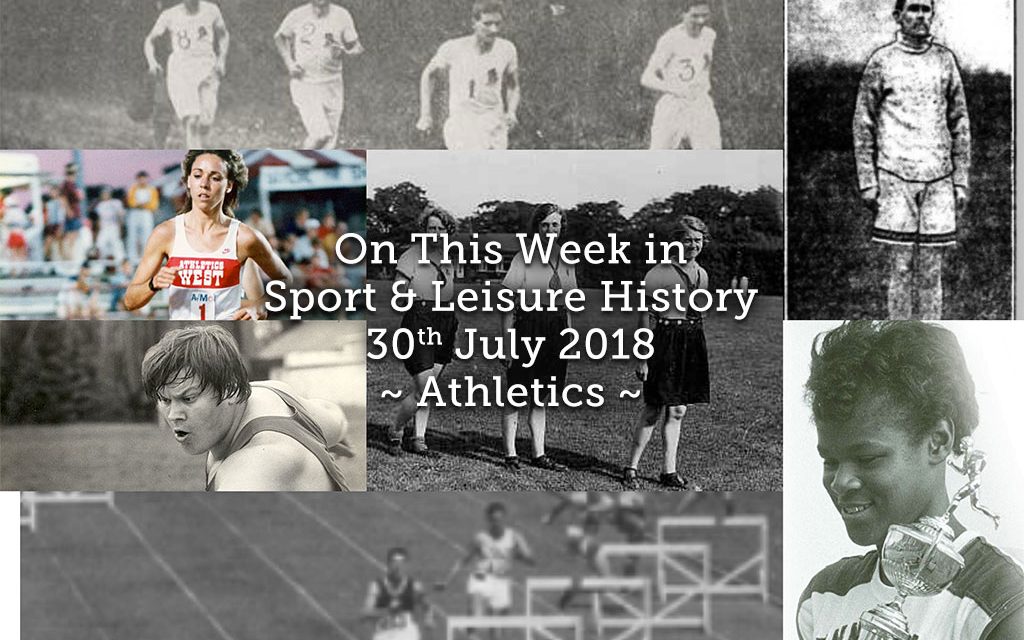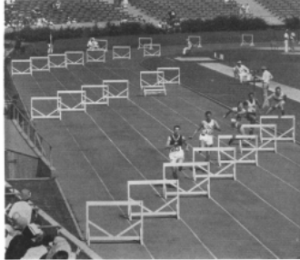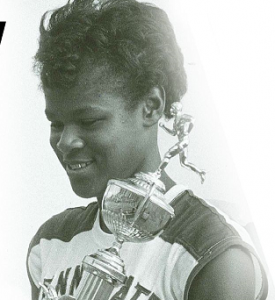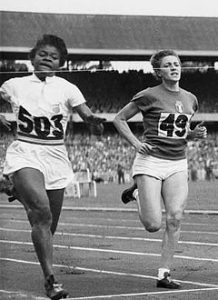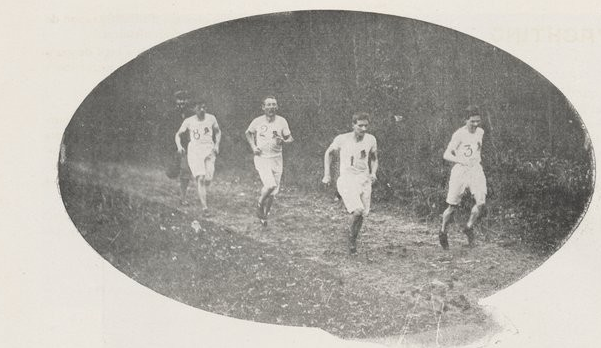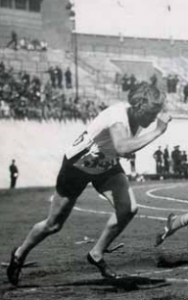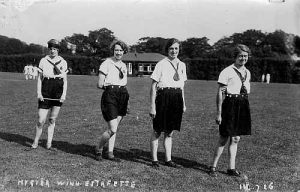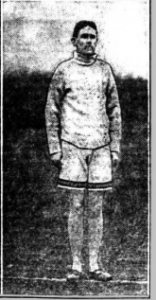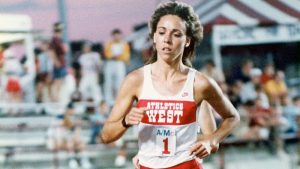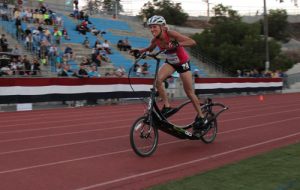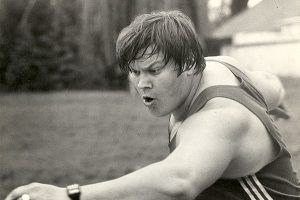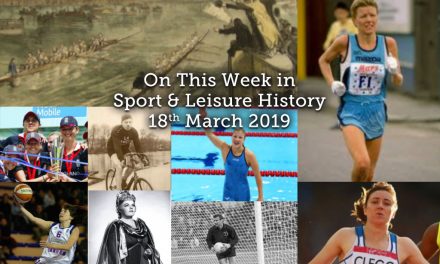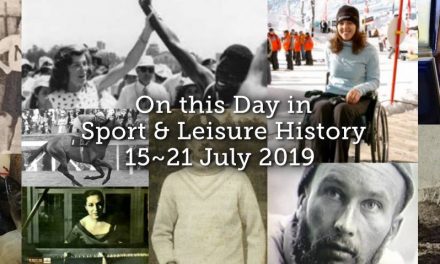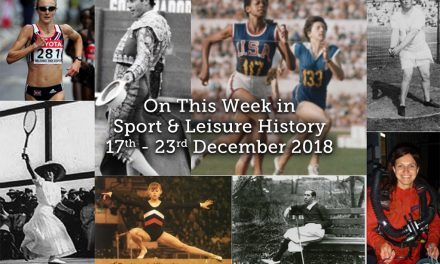30th
German 400m hurdler Friedrich “Fritz” Nottbrock was born on this day in 1910 who travelled at his own expense to the 1932 Los Angeles Olympics. In both 1932 and 1936 he reached the semi-finals of the 400m hurdles. In 1932 and 1933 he was German champion, and he also earned five caps for Germany in five international matches. At the University Games he won a gold medal with the 4x400m relay and a relay silver medal with the Olympic team in 1933, adding two bronzes in the 400m hurdles in 1935 and 1937. Domestically he won German titles in the 400m hurdles in 1932-33. Fritz was a founding member of ASV Köln, a multi disciplinary sports club, instituted in 1929 and in 1932 became its president. Until 1968 he was also Meeting Director of the International Athletics Sports Day in Köln (Cologne), which quickly lured some of the world’s top athletes, with one highlight – an appearance by Owens in 1936 – the year the American swept to four Olympic gold medals. After retiring from competitive events he first became a sports teacher and later began with the study of pharmacy to take over the Rheingold Pharmacy from his father. Fritz was also the long-time organise of the pharmacist-ball in Köln. In 1950 he received the DLV needle in gold, and in 1981, the Federal Cross of Merit. By 2000 the Köln international meeting was struggling financially, caused mostly by dwindling attendance and sponsorship money/athletes being drained off by Golden League meetings. Manfred Germar, the organiser of the last 28 events said “since the Golden League was founded, sponsors have mostly signed up for that series. Naturally, they lack the money for meets like ours, in the short term, there’s no future for our meet.” Fortunately, perhaps, Fritz was not around to see the demise of one of his proudest achievements, as he passed away on 13th March 1997 aged 86.
- 1932 Olympic 400m hurdles heat, Fritz finishing second to eventual gold medallist Tindall
31st
Isabelle Francis Daniels, American sprinter was born on this day in 1937. She grew up in rural Georgia during segregation when the challenges were many. “We only had old textbooks in school and had to use hand-me-down athletic uniforms in my high school basketball team. It hurt in my heart, but we made the best we could do with what we had.” However, her athletic gift was noticed, and a path was opened. Isabelle always did well running against girls from other schools and Ed Temple, the track coach at Tennessee State University, saw her at the 1954 Tuskegee Institute Relays for high school students, inviting Isabelle to try out for a work aid athletic scholarship at TSU, which she won. She worked alongside several talented athletes such as Mae Faggs, who made the 1956 Olympic team with Isabelle, and had already competed in 1948 and 1952. The Tigerbelles were the first TSU team to win the outdoor nationals in 1955, the same year three of the team made it to the Pan American Games. Isabelle realised her dream by being selected for the US track team and competed in the 1956 Olympic Games in Melbourne. She narrowly missed a medal coming fourth in the 100m, but came home with a bronze from the 4x100m relays. “I was actually the anchor on that relay. Mae Faggs ran the first leg, Margaret Matthews went second, and Wilma Rudolph ran third and handed me the baton for the anchor. Wilma was still in high school at that time” Isabelle recalled later. Returning to Georgia, she enjoyed a 35 year career as a health and physical education teacher, coaching girls’ basketball and track. Along the way, she earned numerous state, regional and national coaching awards. “I tried to do what I was taught to do. Our motto at Tennessee State was ‘enter to learn, go forth to serve.’ Coach Temple taught us to respect God first, yourself next, and then respect others. He then taught the fundamentals of how to run and develop a championship mentality,” she notes. “I’ve always passed that on and told my students to always do their very best. I’ve had teams win county and state championships. Some of those girls got scholarships.” She was named National Coach of the Year by the National High School Athletic Coaches Association in 1990 and was inducted into the Tennessee State University Hall of Fame in 1984, and the Georgia Sports Hall of Fame in 1987. Isabelle eventually became a senior athlete at the coaxing of Linda Lowery, a younger runner with National Senior Games experience. She has been going to Nationals since 2007. Isabelle died at the age of 80 on 8th September 2017.
1st
British steeplechaser and cross-country exponent Sidney John Robinson was born on this day in 1876 in Denton, Northamptonshire. The son of the local postmaster and carpenter, Sidney himself was also a carpenter. Affiliated to the Northampton Cycling & Athletics Club, Sidney won a full set of Olympic medals at the 1900 Games. Gold in the 5000m team event in which he finished 6th individually, silver in the 2500m event beating the Frenchman Jacques Chastanié to second place and bronze in the 4000m steeplechase. At the turn of the century Sidney and his two Olympic team-mates Jack Rimmer and Charles Bennett were the best distance runners in Britain. Sidney, who had won the AAA steeplechase four times between 1896-1903 and was twice the champion at 10 miles in 1898 and 1900, was also the National cross-country champion in 1897 and successfully defended that title on “home soil” the following year when Northampton hosted the Championships. In 1897 he led England home against France in a match which was to be the forerunner of the International Cross-Country Championship. Sidney passed away aged 82, on 3rd February 1959 in Long Sutton, Lincolnshire.
- Sidney competing with the rest of the English team in 1897 Cross Country match
2nd
Jeanette Hendrika “Nettie” Grooss, Dutch Olympic sprinter was born in The Hague today in 1905. She represented the Netherlands at that country’s home Olympics of 1928 in the 100m, where she failed to progress to the finals, as well as being a member of the 4x100m relay squad. That relay team of Nettie, Lies Aengenendt, Rie Briejer and Bets ter Horst finished fifth in 49.8s behind the Canadian team who won gold in a world record time of 48.4s. Nettie has some success in the longer 200m sprint when she won two national titles, in 1926 becoming the first official Dutch champion. She was also the very first Dutch record holder for the 100m in 13.1s and 200m in 30.4s, which she improved to 26.6s in 1926, a record which stood until 1930 when Tollien Schuurman deleted her name from the record books. Nettie died on 11th April 1977 aged 71, in her hometown of The Hague.
- Nettie at the start of 1928 Olympic 100m heat
- Nettie on far right with relay team
3rd
Sweden’s Edward Martin Dahl was born on this day in 1886 in Stockholm. He competed at the Intercalated Games in 1906 and the 1908 Olympics in London. In 1906 he won bronze in the 5 miles competition as well as participating in the 1500m where he was eliminated in the early rounds. He competed in 4 events in London, the 800m, where he failed to finish his semi-final heat, the 1500m, in which he finished second in a time of 4:10.4, but which was not enough to progress to the final. He fared little better in the 5 mile race, again failing to advance past the early rounds and with the Swedish team in the 3 mile team event, who were knocked out in heat 2. Edward did once hold the 3000m world record. Running at an event in Norrköping, Sweden on 27th November 1907, he lowered the then record of 9:02.4, held by Louis de Fleurac from France, to 8:55,0. Fleurac had been the fastest man over the distance since 1904. Edward had this time bettered by fellow Swede John Svanberg on August 1908. Records in the event were not officially ratified by The International Amateur Athletics Federation, now known as the International Association of Athletics Federations (IAAF), until 1912. Edward died on 21st November 1961 aged 75 in Enskede, Stockholm.
4th
Mary Thereza Decker, born on this day in Flemington, New Jersey in 1958 has been one the greatest American female middle distance and distance runner. She was a prodigy, breaking American records indoors when she was only 15, and won AAU titles indoors and out in 1974. During her career, she won gold medals in the 1500m and 3000m at the 1983 World Championships, and was the world record holder in the mile, 5000m and 10,000m. In total, she set 17 official and unofficial world records, including being the first woman in history to break 4:20 for the mile. However, this time was never ratified by the IAAF. In 1981 she married fellow American distance runner Ron Tabb. The couple divorced in 1983.In 1982, under the name Mary Tabb, she ran the mile in 4:18.08, breaking the official record of 4:20.89 by the Soviet Lyudmila Veselkova This time was ratified. She did not compete in the 1980 Olympics due to the US-led boycott but did however receive one of 461 Congressional Gold Medals created especially for the spurned athletes. Mary also set 36 US national records at distances ranging from 800m to 10k, and has held the US record in the mile, 2000m and 3000m since the early 1980s, while her 1500m record stood for 32 years. In 2003, she was inducted into the National Track and Field Hall of Fame. In 1984, with the Olympic Games in Los Angeles, Decker (now Decker-Slaney) was the favourite in both 1500m and 3000m. But her form was not as good as 1983 and she placed only second in the US Olympic Trials in the 1500m, and elected to run only the 3k at the Olympics. In the final, on an early lap, she collided with South African Zola Budd who competed for Great Britain in this Olympics, and Decker-Slaney fell to the track with a hip injury, unable to continue. Over the next few years she sustained multiple injuries, underwent multiple surgeries, and never returned to her form of 1983, despite making the 1988 and 1996 Olympic Teams. In 1996, at the age of 37, as she qualified for the 5000m at the Atlanta Olympics, Mary became involved in controversy. A urine test taken in June at the Olympic Trials showed a testosterone to epitestosterone (T/E) ratio greater than the allowable maximum of six to one. At the time of the positive test she was being coached by Alberto Salazar. Mary and her lawyers contended that the T/E ratio test was unreliable for women, especially women in their late 30s or older who are taking birth control pills. In June 1997, the IAAF banned her from competition, but in September 1999, a USATF panel reinstated her. The IAAF cleared her to compete but took the case to arbitration. In April 1999, the arbitration panel ruled against her, after which the IAAF – through a retroactive ban, even though she was cleared to compete – stripped her of a silver medal she had won in the 1500m at the 1997 World Indoor Championships. In April 1999, Mary filed a suit against both the IAAF and the US Olympic Committee, the court ruled that it had no jurisdiction, a decision that was upheld on appeal. In 2012, she started riding the ElliptiGO elliptical bicycle, saying that it gave her the same feeling as her hard running workouts used to, competing in the ElliptiGO World Championships race up Palomar Mountain in San Diego County, finishing second, the following year she took 6 minutes off her previous time and placed third at the 2013 ElliptiGO World Championships.
5th
Yury Eduardovich Dumchev, Soviet discus thrower and later stage and film actor, was born on this day in 1958 in the Russian town of Rossosh, He took up athletics at the age of 16 while at boarding school in Moscow. He competed in both the shot put and discus before specialising in the latter. His first breakthrough came at the 1977 European Junior Championships in Donetsk, where he won with a throw of 53.30m, after which he was selected to the Soviet national team. During his career, which lasted until 1988, he competed at two Olympic Games, finishing fifth in 1980 and fourth in 1988, and at the 1983 World Championships, where he did not advance past the qualifying round. Having thrown a new world record of 71.68m in May 1983 he was considered as a medal contender for the 1984 Olympics, but due to the Soviet boycott. he did not compete at Los Angeles. He instead competed at the Friendship Games, a replacement event held for countries that boycotted the 1984 Olympics, where he won the discus with 66.70m, which was 10 cm more than Olympic champion Rolf Danneberg threw in the Los Angeles Olympic final. Domestically Yury won two titles (1980-81) and four silver medals (1982-83, 1985, 1988) at the Soviet Championships. Alongside his athletics career, Dumchev was a keen actor and starred in many Russian films, and also reached an international audience with occasional cameos in US productions. He took a step back from athletics in 1986 and 1987 primarily to concentrate on his emerging acting career but returned to form in 1988. He threw 70.30m, the second-best mark in the world that year, but finished fourth at that year’s Olympics in Seoul, less than a metre shy of a medal. He retired after the 1992 season and made a brief return in 1997. His best of 71.86m still stands as a national record and is a mark that only three men in history have surpassed. He was also a stage actor with the Mayakovsky Theatre in Moskva and worked as a television presenter for various game and children shows. Yury joined the Russian Actors Union in 1998 and the Union of Cinematographers of the Russian Federation in 2002. However, he also remained involved in athletics, working as a throwing coach in Moscow. He died aged 57 after suffering a cardiac arrest on 10th February 2016 in Alder, Sochi.

